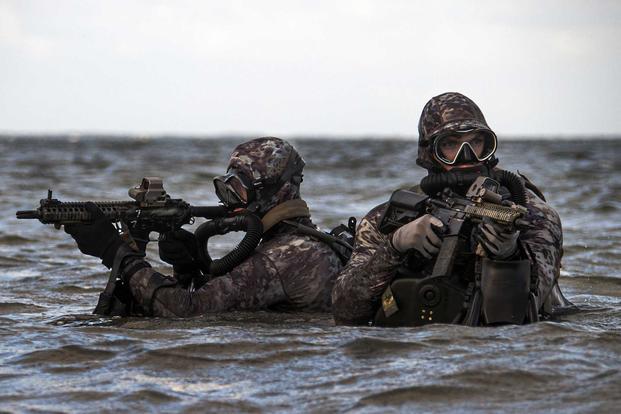Navy Seals Stop Training in State Parks as Locals Sue Over 'War Games'

Navy SEALs have paused training operations in Washington state parks as a legal challenge from locals concerned about the environmental and psychological impacts of "war games" comes to a head.
"I do not care to catch a glimpse of apparently armed men skulking around and I DEFINITELY do not want to risk having my young grandchildren see such a sight," one commenter wrote to state regulators.
Navy SEALs have conducted cold water training and other special operations exercises in the state's coastal parks for more than 30 years. The mountain-ringed shorelines of the parks offer unique challenges for commandos practicing clandestine raids and surveillance training, the Navy says, with "cold water, extreme tidal changes, multi-variant currents, low visibility, complex underwater terrain, climate and rigorous land terrain." The dispute centers primarily on parks near Washington's Puget Sound, as well as along the state's southwestern coastline.
The SEALs' previous five-year agreement to conduct training in five state parks expired in 2020. When the service attempted to renew its agreement with the state and expand the number of parks at which it could train to 28, it was met with organized opposition from local residents and park users.
Hundreds of Washingtonians submitted written and oral comments on the proposal, the overwhelming majority of which were opposed. Commenters cited everything from environmental concerns to fears that SEALs would disturb the peace.
"The plan to have apparently armed people storming beaches in our state parks is an irresponsible and dangerous idea," one resident wrote during the public comment period.
"In these days of great division in our civil society, we don't need stealthy men in camo uniforms toting toy guns around our State and County Parks," wrote another. "People frequent parks to escape tension, not to encounter more. Keep the Navy commando training out of our parks!"
Others were concerned about references to the use of drones, or UAVs. A comment from the Skagit Audubon Society noted that "the Navy's plan is to use larger, gasoline-powered UAV's as well as smaller, electric-powered types. This offers significant potential for direct and indirect injury to birds as well as auditory disruption to the experience of park visitors."
Despite the public outcry, in January 2021 the Washington State Parks and Recreation Commission voted 4-3 to approve a scaled-back version of the Navy's original proposal, placing some sensitive areas off-limits to training and restricting the operations to nighttime hours.
But in March 2021, Whidbey Environmental Action Network (WEAN) filed a petition for judicial review against the Washington State Parks and Recreation Commission, arguing that the proposed training violates laws that dedicate the parks to the public for recreational and ecological purposes. It wants a judge to reverse the commission's decision and award WEAN attorneys' fees and other costs.
WEAN argues many members of the public may avoid state parks for fear of "encountering the proposed war games or being spied upon by Navy personnel," lawyers for the group wrote in its opening brief, filed last month. "It is difficult to find peace in the woods when armed frogmen might be lurking behind every tree."
A hearing in the case is scheduled for April 1 in Thurston County Superior Court. WEAN's litigation coordinator Steve Erickson told Coffee or Die Magazine via email that he expects the judge to issue a final decision sometime after the hearing.
The Navy conducted 37 training events -- each lasting two to 72 hours and including no more than eight trainees plus a small safety cadre -- at Washington state parks from 2015 through 2020. The training included insertion and extraction of personnel via watercraft, reconnaissance, diving, and swimming, Navy spokesman Joe Overton told Coffee or Die in an email.
No Naval Special Warfare training was conducted at the parks in 2021, and operations are on hold again this year pending further review by the parks department, Overton wrote.
Navy officials maintain that there have never been any incidents with park visitors during past exercises, and that the training by its nature requires that trainees leave no trace. Exercises are noninvasive and do not include live-fire ammunition, explosive demolitions, off-road driving or other destructive activities, according to Overton.
Critics have argued that the Navy should use the 46 miles of Washington coastline already under its jurisdiction for exercises rather than state parks. Navy officials have countered that the geography of the parks more accurately represents the type of environment personnel may experience on a mission.
"This area provides a unique environment of cold water, extreme tidal changes, multi-variant currents, low visibility, complex underwater terrain, climate and rigorous land terrain, which provides an advanced training environment," Overton wrote. "Although there are several Navy properties in the area, they do not provide the full range of environments needed for this training to be as realistic as possible."
Hannah Ray Lambert is a staff writer who has previously covered everything from murder trials to high school trap shooting teams
No comments:
Post a Comment